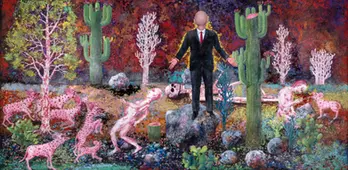Srisasanti Gallery is pleased to present Double Horizon, a solo exhibition by Entang Wiharso. This exhibition reveals how Wiharso has negotiated with several opposing viewpoints stemming from his personal and global interactions in an interval of time between 1998 and 2022.
The corpus of works presented offers a synthesis of a lifetime dedicated to a deep attention to political, economic, social, and cultural systems installed and perpetuated through power relations. His readings, presented through the form of artworks, reveal an inner desire for peace and fair life for all humanity.
Entang Wiharso investigates humans, especially in their relationship with instincts, emotions, beliefs, and belief systems. In his view, these aspects of the human condition can be interconnected with the world’s (current) affairs. His analysis is then articulated with what he perceives as novel forms of institutionalized racism, slavery, and colonialism, which he identifies and conveys in his work.
Wiharso states, “This exhibition is a way to see and re-present my artistic practice over a span of three decades. I believe Art is knowledge and we should share it with others. Having spent significant portions of the last three
decades outside the city of Jogja working in the national and international arena, I want to share this exhibition with the Jogja community where I have lived and worked.”
Entang Wiharso confronts universal issues of power, loss, and love through investigations of ideology, philosophy, and identity. Particularly known for his large-scale paintings, wall sculptures, and installations, his work heightens our ability to perceive, feel and understand human experiences centered on love, hate, fanaticism, belonging, and home. Wiharso’s work is layered with social, political, and sexual critique, revealing a complex picture of the human condition by integrating narrative tools and placing unconventional materials together.
A 2019 Guggenheim Fellowship recipient, Wiharso has developed a distinctive use of glitter to create lush, detailed surfaces that draw viewers in while offering biting, humorous and poignant commentary. Double Horizon showcases Wiharso’s new series of works along with select works from the past three decades. The selection of works focuses on the duality of cultures and experiences in his two homelands - Indonesia andAmerica.
Artworks

Installation Views
Featured Artist













